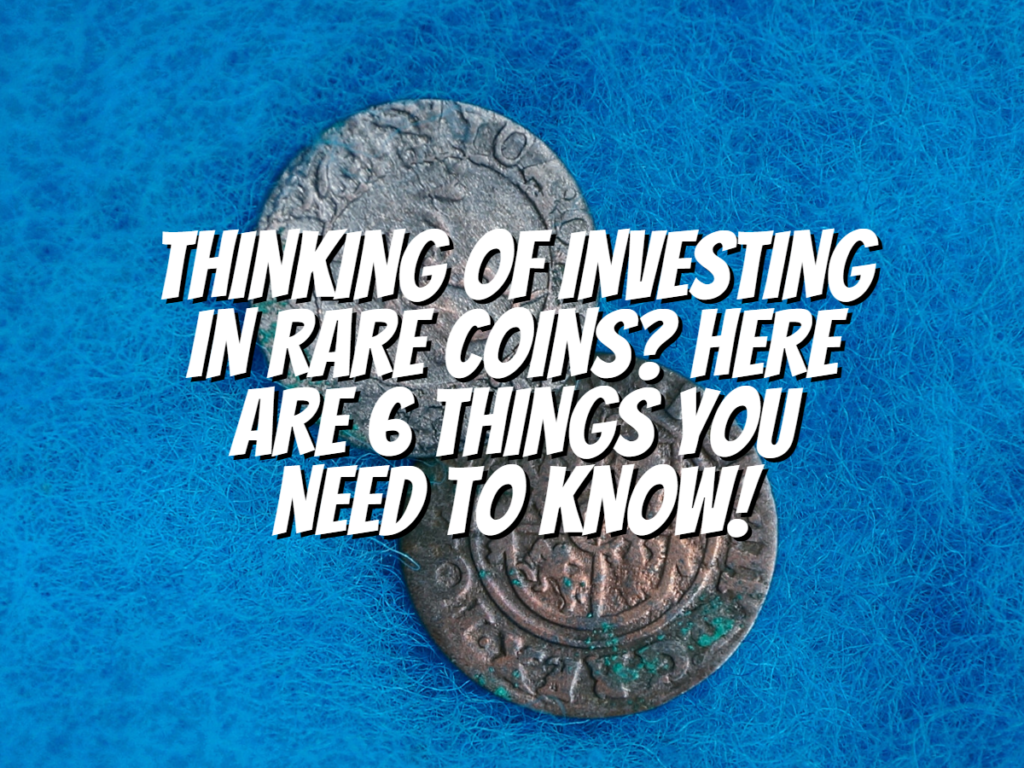Are you considering investing in rare coins but don’t know where to start? Don’t worry. Grand Collector is here to help you! I’ve compiled a list of things you should know if you want to invest in coins! These steps helped me build my collection, and I want to share it with you! Let’s dive right in!
Investing in Rare Coins:
Make Sure You Are Ready to Invest

You should not put money into coins if you expect to need that money within the next few years. They are an investment for the long haul, with the best returns seen after several years have passed. You can protect your wealth by investing in coins and currency as part of a diversified portfolio. Investing all of your money (or even the majority) in a single venture is risky.
Learn about the Hobby

Historically, those who read widely and study the fundamentals before making a sizable financial investment have reaped the greatest rewards. Jumping in mindlessly on the assurances of a cold-calling salesman is a recipe for disaster.
However, suppose you devote some time to learning about rare coins and currency, checking out a few shows where they are sold or traded, reading up on the topic, and taking a sober look at your financial goals and interests. In that case, you might just find yourself with a new and rewarding hobby that offers the possibility of future financial gain.
Know What Makes Rare, Valuable Coins Rare and Valuable

A coin’s grade or level of preservation is crucial when purchasing rare coins. Because even slight differences in quality can profoundly impact price, their value often hinges heavily on grade.
This is why there are third-party organizations that can provide a dependable assessment of a currency item’s condition and legitimacy. After determining the grade, these services place the coin or note in a plastic holder. The process is called certification, and it may be your best defense against overpriced goods artificially inflated in quality.
Work Only With Reputable Dealers

Building a relationship with a knowledgeable and trustworthy dealer is crucial to your success in the rare coin collecting industry.
- Check Their Reputation
- If you find a dealer you like, check with the Professional Numismatists Guild or another industry group for recommendations. Don’t let slick marketing materials and flowery language fool you. Calling or writing someone could be the most cost-effective insurance you’ve ever bought.
- Consider Dealer Longevity
- Dealers with fewer than five years in the industry should be investigated further.
- Ask About Guarantees
- Since they’re looking to build lasting business relationships, reputable coin dealers back their products 100%.
- Check Organizational Memberships
- Dealers who want to be members of trade associations must meet stringent requirements for professionalism. For instance, members of the Professional Numismatists Guild (PNG) must follow a strict code of ethics and submit to binding arbitration for any disputes involving numismatic merchandise.
- Attend Major Coin Shows
- You can talk to some of the best dealers in the country face-to-face if you attend a major coin show. You can count on one within a day’s drive of you sometime in the next six months, and one pops up in the United States nearly every week. While there, introduce yourself to the dealers and try to initiate conversations. It’s essential to inquire first.
Beware of Unbelievable Bargains

Rare coins are subject to the same “if it sounds too good to be true” rule that applies to all forms of investing. Many novice collectors fall prey to the biggest and most expensive trap of all: the good deal, bargain price, or something-for-nothing offer. In numismatics, there is no such thing as Santa Claus.
A dealer gives nothing away for much less than its fair market value. Every dealer needs to make a profit to stay in business, and they should. To put it mildly, it’s naive to think that a retailer would sell you an item for less than its wholesale price. Products marked down excessively from their fair market value are likely to be overpriced, overgraded, or misrepresented.
Modern Rarities

Many recently minted coins are advertised and sold via direct mail and direct marketing as semi-numismatic or private rarities, despite their lack of numismatic value. It’s not uncommon for these to be commemorative coins issued in honor of a particular person or occasion, complete with presentation cases and guarantees of their genuineness.
Before you go…
Third-party marketers often promote these items as investments due to their rarity or the subject matter. Some modern issues, such as those made by the United States Mint, have been appreciated. Still, the vast majority have not and are now worth either the same as their bullion value (or less) or less than what the owner paid for the box and certificate.
Check out my next article: “How To Learn More About Rare Coins?“
Related Articles:

